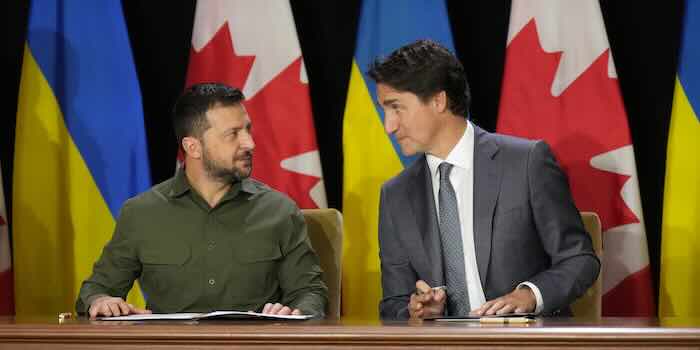By Elizabeth Marshall ——Bio and Archives--December 17, 2023
Canadian News, Politics | CFP Comments | Reader Friendly | Subscribe | Email Us

Having taken time to read over the Canada-Ukraine Free Trade Deal (CUFTA), it seems, this deal is not a very good deal for anyone – Canadians or Ukrainians. Not only does this agreement seem an attempt to bind future Canadian governments, it also seems to violate provincial jurisdiction.
Firstly, if you heat with firewood this really restricts you, as it was agreed, in 2016, by Prime Minister Justin Trudeau, President Barack Obama, and President Enrique Peña Nieto, to reduce “black carbon” which includes deploying renewable energy and efficiency alternatives to firewood, in particular, remote communities.[1] With the CUFTA agreement, Parties are attempting to restrict their citizens from using firewood, to heat their homes (see Article 13.14 of the agreement).
Secondly, this agreement contradicts itself as to whether it is binding or not. In Article 13.3 it states that “the Parties recognize the sovereign right of each Party to establish its own levels of domestic environmental protection and its own environmental priorities, and to establish, adopt, or modify its environmental laws and policies accordingly;” but then in Article 13.4 it states:
In other words, Canada is fully bound by this agreement and the present laws established under this government. And the Ukraine, if we change governments and/or the rules, can take issue with Canada, including demanding a Panel be struck for dispute resolution (see Article 13.29). This includes the “carbon tax” issue (Article 13.10 para. 8).
Thirdly, provincial jurisdiction. Most certainly the federal government can enter into agreements as it did for soft-wood lumber – but when it comes to forest management – that is completely under provincial jurisdiction. So, when this agreement speaks to “Sustainable Forest Management,” in Article 13.22, expressing that “each Party shall encourage trade in forest products from sustainably managed forests harvested in accordance with the law of the country of harvest,” in Canada, it isn’t the “country of harvest” laws – it would be the province of harvest laws.
This would mean the federal government is attempting, through this agreement, (i) to bind the various provinces to an international bilateral agreement, and (ii) interfere, again, in provincial constitutional jurisdiction.
In light of this, it seems the Conservatives weren’t only trying to protect the Ukrainians, but were, also, trying to protect Canadians. Perhaps an entirely different agreement should be struck leaving out the entirety of Article 13, considering Canada and the Ukraine already have international agreements, either pending or in place pertaining to all subjects in Article 13, wouldn’t one agree?
Support Canada Free Press

[1] Reduce black carbon (soot):
Ottawa, Ontario--29 June 2016--Prime Minister Justin Trudeau, President Barack Obama, and President Enrique Peña Nieto share a common commitment to a competitive, low-carbon and sustainable North American economy and society. The Paris Agreement was a turning point for our planet, representing unprecedented accord on the urgent need to take action to combat climate change through innovation and deployment of low-carbon solutions. North America has the capacity, resources and the moral imperative to show strong leadership building on the Paris Agreement and promoting its early entry into force. We recognize that our highly integrated economies and energy systems afford a tremendous opportunity to harness growth in our continuing transition to a clean energy economy. Our actions to align climate and energy policies will protect human health and help level the playing field for our businesses, households, and workers. In recognition of our close ties and shared vision, we commit today to an ambitious and enduring North American Climate, Clean Energy, and Environment Partnership that sets us firmly on the path to a more sustainable future. (Source)
View Comments
• Elizabeth Marshall on Facebook
• Non-Partisan Advocate
• Director of Research Ontario Landowners Association
• Author – “Property Rights 101: An Introduction”
• Board Member/Secretary – Canadian Justice Review Board
• Legal Research – Green and Associates Law Offices, etc.,
• Legislative Researcher – MPs, MPPs, Municipal Councilors,
• President All Rights Research Ltd.,
I am not a lawyer and do not give legal advice. Any information relayed is for informational purposes only. Please contact a lawyer.